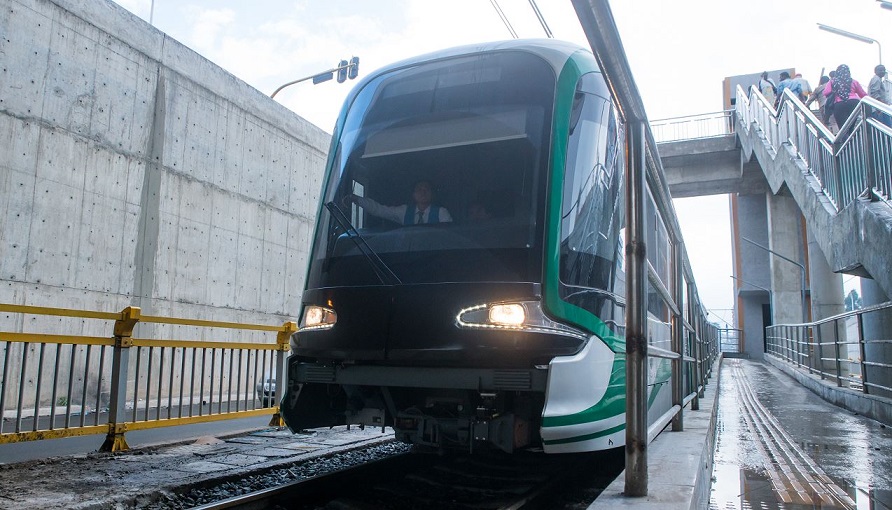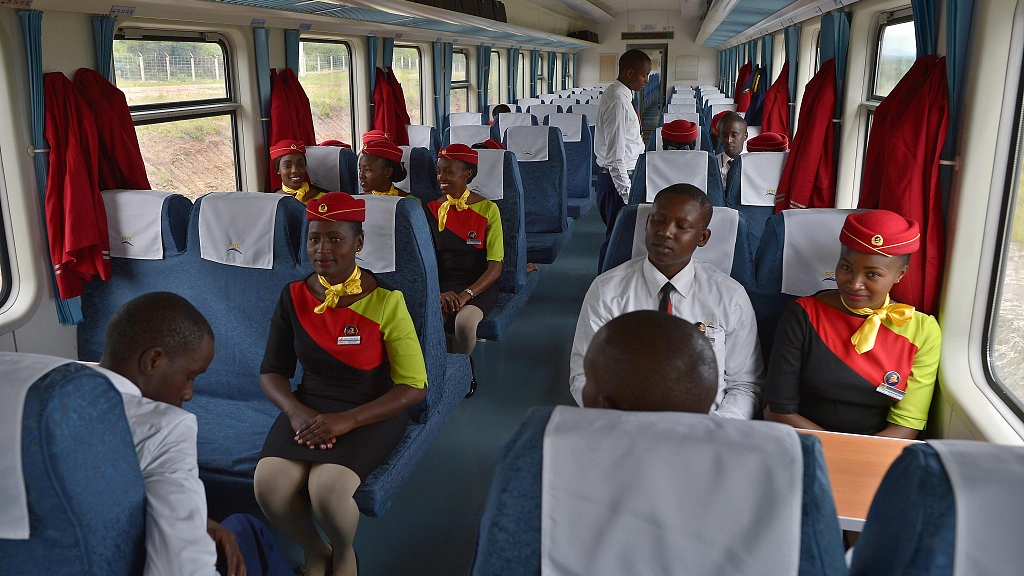
The Ethiopia-Djibouti Standard Gauge Railway line has cut the duration of travel between Addis Ababa and Djibouti to just 12 hours from three days. /Getty Images
The Ethiopia-Djibouti Standard Gauge Railway line has cut the duration of travel between Addis Ababa and Djibouti to just 12 hours from three days. /Getty Images
Editor's note: Lawrence Freeman is a political-economic analyst on Africa for 30 years of experience in Africa promoting infrastructure development policies. The article reflects the author's opinions, and not necessarily the views of CGTN.
For the incoming Biden/Harris administration to make a real difference and have a positive impact on the lives of hundreds of millions of Africans still living in poverty, they should work in partnership with China.
This would require rejecting and reversing the anti-China mindset of the Trump and Obama administrations, echoed by the current chorus of voices spewing from officials of both the Democratic and Republican parties. A repeat of the defective policies of the last 12 years coupled with the shrill geopolitical-motivated propaganda against the nation of China, will not only do little for Africa, harm the United States' interests, but endanger strategic relations between the three parties.
It should be obvious to qualified leaders, as it is to me, that the horrific conditions of life for a majority of Africans, reflects the scope of the continent's deficit in vital infrastructure. Over 600 million are without access to electricity, over 400 million Africans live in poverty, and several nations are currently threatened with famine. If the two economic powerhouses, China and the United States, worked in partnership with African nations, this impoverishment could be eliminated.
Failures of Trump and Obama
Presidents Trump and Obama similarly failed to understand the necessary requirements to create real physical economic growth to improve living conditions, either for Americans or for Africans. Neither comprehend the principles of the American system of economics that built the foundation of the industrialized U.S. Their conception of economics remains dominated by a belief that the wealth of a nation is measured by Wall Street's monetary values.
Trump began his presidency establishing an amicable relationship with Chinese President Xi Jinping. Unfortunately, that quickly deteriorated as Trump propitiated the anti-China prejudices of his supporters. Although his road to the White House was achieved by his status as an outsider to the Washington establishment, it was evident by the second year of the Trump administration that he had acquiesced to the same geopolitical world view of his predecessors. Geo-political doctrine speciously asserts that nations are either winners or losers in a zero-sum game with the world as a chessboard, holding that the only interest of a superpower is achieving hegemony, while rejecting any conception of a shared common interest among nations. His choice of neocons, Mike Pompeo for Secretary of State, and John Bolton as National Security Advisor in April 2018 left no doubt regarding the direction of Trump's foreign policy.
On December 18, 2018, speaking at the Heritage Foundation in Washington, Bolton unveiled Trump's so-called Africa Strategy. In his presentation, Bolton defined the goal of U.S. policy in Africa, to wit: Stopping China's advances on the continent. In less than an hour, he attacked China and its Belt and Road Initiative 17 times. President Trump did not disavow Bolton's assault on China, nor his demeaning treatment of Africa as a game board for geopolitics.
Prior to President Obama's anti-China Asian Pivot in January 2012, his administration launched the most destructive military operation against an African nation by any U.S. President. In October 2011, President Obama, advised by UN envoy Samantha Powers, Assistant Secretary of State for African Affairs Susan Rice and Secretary of State Hillary Clinton, toppled the government of Libya.
This irresponsible military adventure resulted in the destruction of the nation of Libya, turning it into a failed state for the last nine years, unleashing hordes of violent extremists across the Sahel into Mali, Burkina Faso, Niger and Nigeria, and causing tens of thousands of deaths and displacing millions of Africans.

Hospitality crew members wait inside a new standard-gauge passenger car prior to a journey to Nairobi, on May 29, 2017 in Mombasa. /VCG Photo
Hospitality crew members wait inside a new standard-gauge passenger car prior to a journey to Nairobi, on May 29, 2017 in Mombasa. /VCG Photo
China Delivers Infrastructure
Contrary to U.S. squealing and whining about China's influence in Africa, Deborah Brautigam of the Washington-based China Africa Research Initiative, precisely presents the paradox: "China still addresses Africa's hunger for structural transformation in a way the West does not."
China has increasingly been engaged with African nations over the past two decades to build vitally needed infrastructure in rail, energy, ports, airports, roads, etc., and the U.S (West) has not.
Take rail for example. Examine China's commitment to building railroad tracks in Africa, as reported by the Washington think tank, Center for Strategic and International Studies (CSIS).
"Between 2008 and 2019, China built an average of 5,464 kilometers (km) of railway track per year. Roughly half of the new track added was high-speed rail. At 35,388 km, China's high-speed rail network is the largest in the world." China has built an additional 100,000 km of non-high speed rail track.
China's construction of Kenya's Standard Gauge Railway and the Addis Ababa to Djibouti railroad are exemplary of crucial infrastructure projects for Africa.
Michelle Gavin in her December 3 post, The United States and Europe Should Work Together to Promote a Prosperous Africa, expresses the dilemma for U.S.-Africa policy:
"There is no doubt that U.S. influence – and therefore U.S. capacity to achieve various foreign policy goals – suffers when China's investments in the tangible, visible infrastructure of African prosperity appear (sic) to dwarf U.S. development efforts."
Speaking in China on December 8, Rahamtalla Osman, the permanent representative for the African Union in China, said, "The goals of the BRI coincide with the AfCFTA," referring to the African Continental Free Trade Area.
The 'Same Old' Will Not Do
As the inauguration of the new U.S. president nears, many words are written extolling how a Biden administration will bring a return to "normalcy, global alliances, international diplomacy." We should think for a minute. Do we want to return to war, regime change, sanctions and drone assassinations as the core of U.S. foreign policy? Early indications are that under Biden, the U.S. will pursue a more belligerent policy with China. How will this realignment shift the world to a higher platform of development? How will it stimulate economic growth in Africa?
The Biden-Harris agenda for Africa is vague with no specifics to address Africa's urgent needs. Ambassador Linda Thomas-Greenfield, who is President-elect Biden's nominee to be envoy to the United Nations, has a deep background in Africa and is respected by many African leaders. Having played a prominent role in the Biden transition team, she may be an individual who can put a focus on Africa in the new administration. However, it is unclear what those policies will be.
For the incoming administration to genuinely support Africa, the new president should audaciously break from past boundaries of previous thinking and join with China in launching a great mission for mankind: the elimination of poverty in Africa within the next generation through massive infrastructure expansion. That is my mission.
(If you want to contribute and have specific expertise, please contact us at opinions@cgtn.com.)

